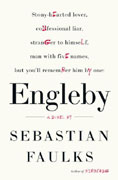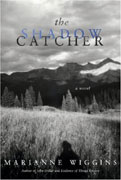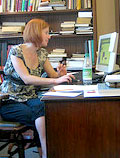Mole's-Eye View
This article has moved here:
My profile here:
Olsson's: Recommended ReadsOlsson's is a locally Owned & Operated, Independent chain of six book and recorded music stores in the Washington, D.C. area, started by John Olsson in 1972. Elizabeth Frengel worked at Olsson's Lansburgh/Penn Quarter store before joining the office staff. Each week, she sends out a rundown on some of her favorite reads. Wednesday, October 31, 2007 Tuesday, October 16, 2007New Novels of Seductively Alluring Deceptions Remember the controversy surrounding A Million Little Pieces and the revelation that James Frey was not entirely factual about the circumstances he "experienced"? Or Life of Pi that won the Booker Prize and Yann Martel's subsequent disclosure that he had been "inspired" by Moacyr Scliar's Max and the Cats? Both of these are extraordinary works of extremely creative writing in spite of the reader necessarily losing confidence in the veracity of the author. If the story is appealing, does it become less important if the teller is telling the truth? If the story, or a life, is told or lived with artistry, can it be held to different standards? Remember the controversy surrounding A Million Little Pieces and the revelation that James Frey was not entirely factual about the circumstances he "experienced"? Or Life of Pi that won the Booker Prize and Yann Martel's subsequent disclosure that he had been "inspired" by Moacyr Scliar's Max and the Cats? Both of these are extraordinary works of extremely creative writing in spite of the reader necessarily losing confidence in the veracity of the author. If the story is appealing, does it become less important if the teller is telling the truth? If the story, or a life, is told or lived with artistry, can it be held to different standards?Last week my book selections focused on individuals who struggled alone against a hostile world (largely inhabited by hostile or indifferent people). This week I present for your consideration three novels in which the reader learns that a central character withholds information, if not being outright duplicitous. Not only are the stories original, but in each case the method of telling the story is unusual. Primary characters have darkly, seductive flaws and may be leading others astray. Yet their stories are compellingly engrossing, leading the readers deeper into tangled and multi-layered webs of plot. One asks if the narrators are trustworthy and reliable? Are they concealing more from their audience than they admit? The stories seem to hold together, but have these protagonists told us, and the other characters, everything needed to correctly interpret the world they present? Are other characters complicit in the deceptions? Or is their own information and self-awareness truly limited, and they are a genuinely acting on all the information they know? Novels like these delve into the complexity of life and relationships, and the complications and devastation that can arise from these manipulations.  Most of all I have to recommend Sebastian Faulks' newest book Engleby (Doubleday, $24.95) which follows a young boy from boarding school to his university years and then a professional career. Through it all, the reader becomes aware that, not only is Michael Engleby a social misfit, making few friends, there is definitely something even more off-kilter about him. Faulks makes Engleby a clever and articulate observer of the vibrant and stimulating, musical, artistic, and social environment of the late 1960s and early 1970s among university students in England. He's an affable, enjoyable narrator, although also caustic and cynical. However, it gradually becomes clear that he clearly is omitting certain details of his life as he skips back and forth in time, writing what increasingly appears to be a confessional journal. Engleby's assertions that he is friendly with the peers he describes, initially provoke sympathy as this intelligent young man clearly wishes but fails to connect, and then become alarming, as the reader wonders if he is not actually sociopathic. A large part of this well-crafted, even horrifying, drama results from Engleby's narration leading the reader to certain conclusions long before Engleby reaches them himself. Most of all I have to recommend Sebastian Faulks' newest book Engleby (Doubleday, $24.95) which follows a young boy from boarding school to his university years and then a professional career. Through it all, the reader becomes aware that, not only is Michael Engleby a social misfit, making few friends, there is definitely something even more off-kilter about him. Faulks makes Engleby a clever and articulate observer of the vibrant and stimulating, musical, artistic, and social environment of the late 1960s and early 1970s among university students in England. He's an affable, enjoyable narrator, although also caustic and cynical. However, it gradually becomes clear that he clearly is omitting certain details of his life as he skips back and forth in time, writing what increasingly appears to be a confessional journal. Engleby's assertions that he is friendly with the peers he describes, initially provoke sympathy as this intelligent young man clearly wishes but fails to connect, and then become alarming, as the reader wonders if he is not actually sociopathic. A large part of this well-crafted, even horrifying, drama results from Engleby's narration leading the reader to certain conclusions long before Engleby reaches them himself. The Shadow Catcher by Marianne Wiggins (Simon & Schuster, $25.00) is a fictional account of the famous anthropological archivist and photographer of native Americans - Edward Curtis, and his relationship with his wife and family. But it also describes a character named Marianne Wiggins who has written a novel about Edward Curtis, and who subsequently receives a phone call that her father who she knows to have died twenty years before is now dying in a hospital in Las Vegas. A multilayered and self-referential story, connecting characters seemingly unrelated, reminiscent of Charlie Kaufman's film Adaptation and its retelling of Susan Orlean's The Orchid Thief. I was most intrigued by the determination that led Curtis to fabricate his photographs, creating a "reality" for his subjects that was not an honest depiction. He had them wear costumes that were not authentic, selectively cropping out modernity, such as houses and automobiles, all because these were the images that he believed people wanted to see, of the noble disappearing heritage of the Native American tribes. At the same time, his children idolized him, creating a mental image of the noble hero, in spite of the fact that he was emotionally disengaged from them, compelled only by his photography expeditions, and spent very little time at home with them and their mother. People believe what they want to believe and create their own realities. This is a novel about the discovery of reliable truths. The Shadow Catcher by Marianne Wiggins (Simon & Schuster, $25.00) is a fictional account of the famous anthropological archivist and photographer of native Americans - Edward Curtis, and his relationship with his wife and family. But it also describes a character named Marianne Wiggins who has written a novel about Edward Curtis, and who subsequently receives a phone call that her father who she knows to have died twenty years before is now dying in a hospital in Las Vegas. A multilayered and self-referential story, connecting characters seemingly unrelated, reminiscent of Charlie Kaufman's film Adaptation and its retelling of Susan Orlean's The Orchid Thief. I was most intrigued by the determination that led Curtis to fabricate his photographs, creating a "reality" for his subjects that was not an honest depiction. He had them wear costumes that were not authentic, selectively cropping out modernity, such as houses and automobiles, all because these were the images that he believed people wanted to see, of the noble disappearing heritage of the Native American tribes. At the same time, his children idolized him, creating a mental image of the noble hero, in spite of the fact that he was emotionally disengaged from them, compelled only by his photography expeditions, and spent very little time at home with them and their mother. People believe what they want to believe and create their own realities. This is a novel about the discovery of reliable truths. Finally, I recommend Samedi the Deafness by Jesse Ball (Vintage Books, $12.95) as a read unlike anything I've ever seen before. The novel is told almost entirely in a sequence of disjointed, declarative sentences, as if the narrator is emotionally disconnected from the events he is living, a human who experiences life like a computer. James Sim is mnemonist - a man with a photographic memory and a disciplined observer of life. Initially approached in a park by a man dying from a knife wound, he gains basic clues to the facts behind the murder, and believes that it is his duty to piece together why this man was targeted. As he gets closer to an apparent plot of terrorism, he becomes a willing resident in an asylum for compulsive liars which he suspects the plotters have either created or conveniently occupied to throw the authorities off their trail. A noir detective story in an utterly peculiar style. Finally, I recommend Samedi the Deafness by Jesse Ball (Vintage Books, $12.95) as a read unlike anything I've ever seen before. The novel is told almost entirely in a sequence of disjointed, declarative sentences, as if the narrator is emotionally disconnected from the events he is living, a human who experiences life like a computer. James Sim is mnemonist - a man with a photographic memory and a disciplined observer of life. Initially approached in a park by a man dying from a knife wound, he gains basic clues to the facts behind the murder, and believes that it is his duty to piece together why this man was targeted. As he gets closer to an apparent plot of terrorism, he becomes a willing resident in an asylum for compulsive liars which he suspects the plotters have either created or conveniently occupied to throw the authorities off their trail. A noir detective story in an utterly peculiar style.For all of their creative styles, and the simultaneously alluring and alienating lead characters, I recommend these books. Enjoy! Andrew New Novels about American Journeys Hello, my name is Andrew Getman, and I'm a new contributor to this column on Recommended Reads, which Elizabeth has been writing. I have worked for Olsson's for a little over four years in four stores, most recently managing the National Airport location since August 2006. I also recently joined the Olsson's Book Buyers' Circle so I am gleaning a little extra insight into the upcoming releases from meetings with the publishers' representatives and the catalogs we use for ordering. Hello, my name is Andrew Getman, and I'm a new contributor to this column on Recommended Reads, which Elizabeth has been writing. I have worked for Olsson's for a little over four years in four stores, most recently managing the National Airport location since August 2006. I also recently joined the Olsson's Book Buyers' Circle so I am gleaning a little extra insight into the upcoming releases from meetings with the publishers' representatives and the catalogs we use for ordering.For this first submission, I've decided to share a few noteworthy books that have the common element of journeys, in which the principle characters are on the road to some destination and also making profound personal discoveries. Perhaps this is subconsciously motivated by the reissue of Jack Kerouac's Scroll Edition of On the Road, or the success and attention drawn to Cormac McCarthy's The Road; however, it also just happens that these are new releases that caught my eye. All of them are colored by the brutal realities of American struggles for survival, and are richly poignant in their scenarios and character portrayals. In Away, Amy Bloom writes a tale of immigration and desperation, of hope against all odds. Lillian Leyb loses her family and most importantly her daughter Sophie in a Russian pogrom, and attempts to create a new life for herself in 1920s America. She comes to this new land with no English language and no marketable job skills, and must rely on her wits and her luck to see her through. She gets word that her daughter may have survived and decides to journey across the country to reach the far East of Russia in order to attempt to find her, subjecting herself (and the reader) to the mercy of a harsh landscape and variably brutal and kind treatment at the hands of strangers she encounters. Redemption Falls is the new novel by Joseph O'Connor, who previously astounded readers with Star of the Sea. He turns his attention to a panoramic saga of the Irish experience in America after the Civil War, and has created a novel of Faulknerian and Joycean complexity as he leaps from character to character, several of whom seem to have been driven mad by the trauma they have experienced in their quests for survival. It takes effort to read, but is well worth the time placing yourself into this richly unfolding world. Soul Catcher by Michael White follows Augustus Cain, a young southerner raised by a harsh father, who finds that his only marketable skill is tracking runaway slaves. This anti-hero, an alcoholic gambler, who seems to only disappoint those who care about him, attempts to live an honorable life. He has run from his duties to his family's farm, lost and betrayed the woman he loved, and finds himself working with brutal men he can't respect, while he intuitively understands the escaped slaves' pursuit of freedom. He reads Milton's Paradise Lost, and reflects on human nature and the struggle between another anti-hero - Satan - and God. Discovering whether this is because he conceals his true, corrupted identity from himself, or because he is actually a better man than circumstances and fate have made him, is a central theme. Also noteworthy is Look Me in the Eye: My Life with Asperger's, a memoir by Augusten Burroughs' older brother John Elder Robison. Growing up with the same crazy parents, John was six years older than Augusten, and their mental instability did not reach the force or crescendo that put Augusten at such risk until after John was reasonably independent and able to care for himself. Moreover, since he was an undiagnosed case of Asperger's Syndrome, the workings of his brain insulated him a bit from the emotional manipulation of those around him. His book does not provoke the overwhelming sense of shock, crisis, and concern that one gets when reading of the neglect that Augusten experienced in Running With Scissors, but it portrays with remarkable clarity John's profound confusion while growing up. It also speaks to his resilience in charting a course for himself as someone who could not fix the lives breaking apart around him, but discovered a talent and marketable skill fixing machines - notably and to huge success in crafting Ace Freehly's exploding guitars for the Kiss concert tours, and later rebuilding luxury European automobiles. It also gives the reader insight into the experience of an Asperger kid and how he eventually creates techniques to overcome this obstacle and establish meaningful emotional relationships. I hope many of you will appreciate these selections as I have, and I look forward to sharing more books with you over the coming weeks. -Andrew Previous Post on "Event News" |

Elizabeth FrengelElizabeth Frengel writes about good reads – from classics on the brink of obscurity to contemporary kids’ books. She’s especially interested in between-the-wars European lit and is an unabashed Anglophile and connoisseur of the British mystery. In addition to having served her time at Olsson’s at the Lansburgh location and in the office, Elizabeth taught writing at American University. She will soon step into the role of manager of reader services at The Society of the Cincinnati. Previous Posts
Archives
|